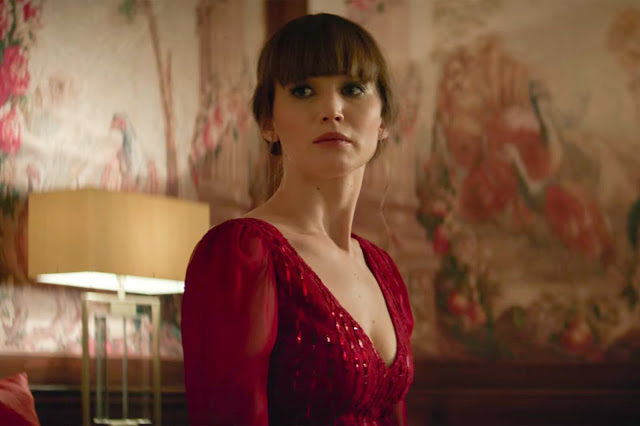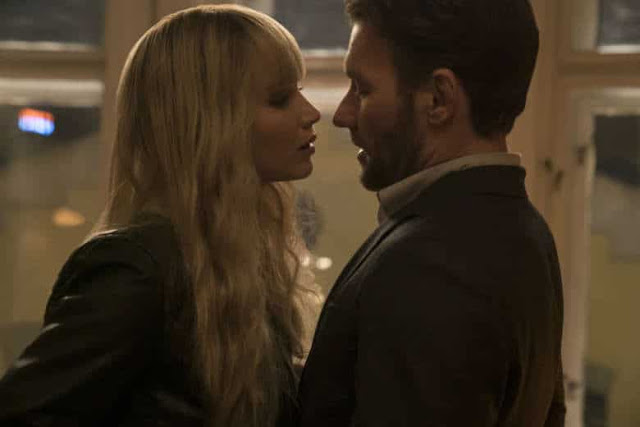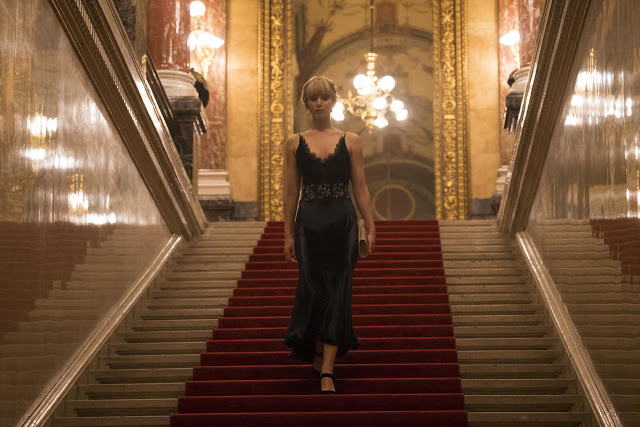In the deeply silly and agreeably entertaining Red Sparrow, Jennifer Lawrence plays a Russian ballerina who transforms into a devious and lethal spy. If you think that sounds like a stretch, you’ve never seen Lawrence act. Having previously applied her prodigious talents to a number of American Everywomen—housewives and mothers, travelers and strivers—here she dons an ushanka and a Russki accent, soldiering forward in a chilly, vodka-soaked Europe. It’s a ridiculous part, but Lawrence is just too damned good to let it go to waste. She initially plays it big and bold—savoring every morsel of Russian diction and leaning into every absurd revelation—only to sneak up on you with her intelligence and vast feeling. All good actors can play well-written roles convincingly; here, Lawrence turns an outrageous conceit into a real character.
That’s more than I can say for Red Sparrow, an implausible thriller that, despite a capable cast and a tone of deadly self-seriousness, struggles to transcend its narrative shortcomings. But while the movie has significant problems—it is too long, too scattered, and too convoluted—it is never less than watchable. Star power can go a long way, and so can sleaze.
The sleaze arrives early in Red Sparrow, though not before a riveting opening that features a sickening snap of bone, a shocking red dress, and a sliced throat. Blood spills everywhere in this film, including onto the hands and face of Dominika Egorova (Lawrence), a renowned dancer who, after grievously injuring her leg, finds herself pressed into state-sponsored sex work. After she flashes some quick thinking along with some flesh, her high-powered uncle, Ivan (a slimmed-down Matthias Schoenaerts), recommends her to the Sparrows, an elite corps of shadowy operatives trained to use their bodies to seduce and destroy. Or, as someone else calls it: Whore School.
The extended sequence involving Dominika’s sparrow schooling is trashy, slimy, and ludicrous. It also represents Red Sparrow at its best, and not just because Lawrence repeatedly takes off her clothes. This movie is most confident at its most overheated, abandoning the pretense of being a sophisticated spy thriller and instead luxuriating in its status as a piece of lurid pulp. (Avid readers of Cold War fiction may recall Nelson DeMille’s The Charm School, while #PeakTV fans will undoubtedly find their thoughts drifting to the far superior The Americans.) That’s why, of all the venerable British actors imported to infuse the production with a touch of patrician class—both Jeremy Irons and Ciaran Hinds portray Moscow military officers—the most successful is Charlotte Rampling, who plays the sparrows’ sinister matron with a delicious veneer of knowing smarm. (Also smartly steering into the skid: a supremely oily Douglas Hodge as a lecherous Russian bureaucrat, and a delightful Mary-Louise Parker as an avaricious American drunkard.)
But beyond that, one of the pleasures of Red Sparrow lies in watching a subjugated woman use her poise as well as her beauty to reclaim her agency. That’s why the movie’s most satisfying scene has nothing to do with espionage or interrogations or secret identities; instead, it features Dominika slyly turning the tables on a predatory male classmate, using both her body and her mind to shame him into literal smallness.
Dominika is such a fun character, and Lawrence such a captivating presence, that it’s a bummer Red Sparrow insists on expanding its orbit beyond her cloistered world of sweaty intrigue. Perhaps the director, Francis Lawrence—reteaming with his namesake after working with her on the last three Hunger Games films, two of which were pretty good and one of which decidedly wasn’t—and his screenwriter, Justin Haythe (adapting the book by Jason Matthews), felt obligated to balance out the film’s hammer-and-sickle oppression with some homespun, red-white-and-blue decency. In any event, they spend far too much time across the pond with Nate Nash (Joel Edgerton), a dedicated CIA agent bent on reestablishing ties with his Soviet asset. (At least I think he’s a Soviet: The movie has a curious, not unpleasant out-of-time quality; a few characters seem to have smartphones, but others store crucial information on floppy disks.) There’s some potential in the broader premise, which involves Dominika and Nate cagily circling one another, each hoping to trick the other into revealing precious information. Yet while Edgerton is an accomplished and sensitive performer, he can’t hold the screen on his own, and the movie suffers whenever his sparring partner is sidelined. I am always happy to see talented character actors like Sakina Jaffrey and Bill Camp getting work—here, they play Nate’s skeptical superiors—but surely we didn’t need numerous scenes of the three Yanks strategizing, pondering Dominika’s true intentions.
Perhaps their bewilderment is intended to mirror that of the audience, because Red Sparrow’s byzantine plot is awfully hard to follow. The constant industry chatter—about assets and moles, black ops and double agents—places the film comfortably within the heightened realm of spy fiction, but its parade of revelations is likely to induce shrugs rather than gasps. The same is true of the manufactured romance between Dominika and Nate. It’s a clever enough idea on the page, two cautious soldiers tumbling into bed while simultaneously questioning if their sex is the product of chemical attraction or professional manipulation. But there is so little heat between Lawrence and Edgerton—their most charged moment occurs at an indoor pool, where Nate can’t help but gape as Dominika strides past him in a tight-fitting swimsuit—that it’s difficult to take even the suggestion of feigned passion seriously.
Yet the real problem with Red Sparrow is its puzzle-box structure, which is fundamentally gimmicky and deflating. As the movie progresses, it invites us to speculate as to Dominika’s true loyalties; is she a steadfast servant of Mother Russia, or has she chosen to abandon her homeland and collaborate with the West? The screenplay delays answering this question for as long as possible, resulting in an irritating, 50-50 guessing game that renders the exercise pointless. Anything is possible, which means nothing is surprising. And even if some of the particular twists may be unpredictable, the film’s overall trajectory proceeds exactly as you’d expect.
As inevitable as the journey may be, it is not without its stylish diversions. As a filmmaker, Francis Lawrence doesn’t yet possess a signature, but he’s an expert blocker, arranging his players in the frame with geometric precision. He also, after the sanitized violence of the Hunger Games pictures, seems to revel in taking the gloves off; there are some marvelously squirmy sequences here, including a scene of torture that gives new meaning to the skin graft procedure. And let’s not forget that this is a hammy movie that paints the Russian government as an insidious, meddlesome kleptocracy, which means it may be less appropriate for screening in multiplexes than in the White House.
Besides, no cinephile could resist what should have been the movie’s closing image: Dominika, clad in black and centered perfectly in the frame, silently and solitarily descending a red-carpeted staircase, the world entirely her oyster. And throughout Red Sparrow, Jennifer Lawrence demonstrates how trash can be elevated through craft. With the smallest of gestures—the way a smile plays on her lips, the way she pauses before pretending to be distraught, the way her body wrenches as she vomits from fear—she reminds us what great actors can do. At one point, a colleague tells Dominika, “You are better at this than any of us,” proof that every once in awhile, even Russian spies will tell the truth.
Jeremy Beck is the editor-in-chief of MovieManifesto. He watches more movies and television than he probably should.




